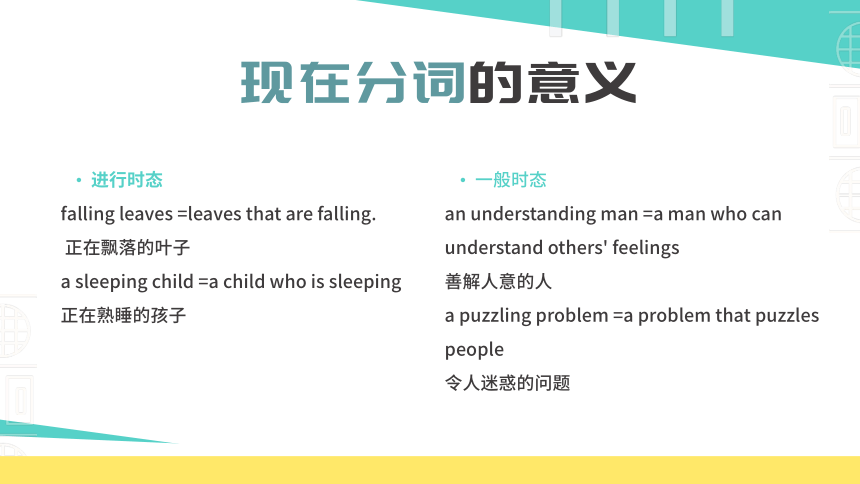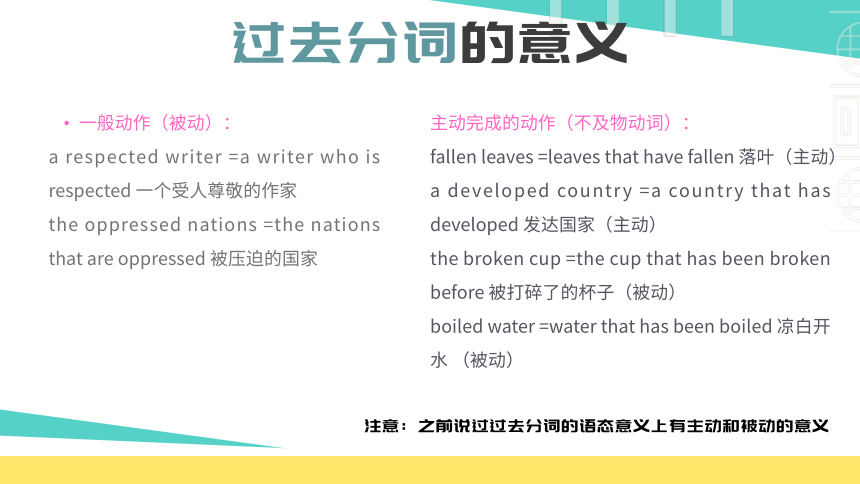2024届高考英语复习语法:分词 (分词的意义分词作状语定语补语)课件(共75张PPT)
文档属性
| 名称 | 2024届高考英语复习语法:分词 (分词的意义分词作状语定语补语)课件(共75张PPT) |  | |
| 格式 | pptx | ||
| 文件大小 | 185.4MB | ||
| 资源类型 | 教案 | ||
| 版本资源 | 其它版本 | ||
| 科目 | 英语 | ||
| 更新时间 | 2024-04-09 09:47:07 | ||
图片预览












文档简介
(共75张PPT)
分词
分词的意义
对比下面两个句子:
1) the sinking ship
2) the sunken ship
引言
从表面上看起来,这两个短语都可以翻译成“沉船”, 但其实二者的含义相去甚远。
在短语1)中,the sinking ship相当于the ship that is sinking,表示“正在下沉的船”,即此处的现在分词 sinking表示的是一个主动的正在进行的动作。
在短语2)中,the sunken ship相当于the ship that has sunken,表示“已沉于水底的船”, 即此处的过去分词sunken表达的是一个主动的已经完成的动作。
引言
分词的意义
不管是现在分词还是过去分词,我们可以从两个角度来考查分词的含义——语态意义和时态意义。
语态:主动/被动
时态:各种时态
首先,我们先来分析现在分词的语态意义。
1.现在分词表示主动意义(现在分词只有主动意义,没有被动意义)
the sinking ship = the ship that is/was sinking
现在分词的意义
现在,我们再来分析现 在分词时态意义。
现在分词的时态意义主要有两种:
1. 表示进行的动作,相当于一个进行时态;
2. 表示一般的动作,此时相当于一个一般时态。(不一定是一般现在时)
现在分词的意义
注意:一般时态不一定指“一般现在时”(具体参考时态相关语法知识点)
现在分词的意义
一般时态
an understanding man =a man who can understand others' feelings
善解人意的人
a puzzling problem =a problem that puzzles people
令人迷惑的问题
进行时态
falling leaves =leaves that are falling.
正在飘落的叶子
a sleeping child =a child who is sleeping
正在熟睡的孩子
现在分词的意义总结
结合语态和时态意义,现在分词能表达下面两种意义:
主动(语态)+进行(时态)意义:a sleeping child =a child who is sleeping
主动(语态)+一般(时态)意义:a puzzling problem =a problem that puzzles people
同理,过去分词的意义也可以从语态意义和时态意义考虑。
语态意义(* 过去分词的语态角度需要考虑动词是否为及物动词)
及物动词的过去分词只表示被动含义,没有主动含义。
the broken cup = the cup was broken。
不及物动词的过去分词没有被动含义,只有主动含义 (比较少见)
the sunken ship =the ship that has sunken
过去分词的意义
注意:不及物动词的过去分词远比及物动词的过去分词出现的频率要低,因此常见的过去分词都是从及物动词变化过来的, 所以过去分词通常表示被动意义(不及物动词的过去分词除外)
时态意义:
过去分词的时态意义有两类意义有两类:
一般动作,相当于一般时态意义。
完成动作,相当于完成时态意义。
过去分词的意义
注意:一般时态不一定指“一般现在时”(具体参考时态相关语法知识点)
一般动作(被动):
a respected writer =a writer who is respected 一个受人尊敬的作家
the oppressed nations =the nations that are oppressed 被压迫的国家
主动完成的动作(不及物动词):
fallen leaves =leaves that have fallen 落叶(主动)
a developed country =a country that has developed 发达国家(主动)
the broken cup =the cup that has been broken before 被打碎了的杯子(被动)
boiled water =water that has been boiled 凉白开水 (被动)
注意:之前说过过去分词的语态意义上有主动和被动的意义
过去分词的意义
过去分词的意义总结
结合语态和时态意义,现在分词能表达下面两种意义:
被动(语态)+一般(时态)意义:a respected writer =a writer who is respected
被动(语态)+完成(时态)意义:the broken cup =the cup that has been broken
主动(语态)+完成(时态)意义(不及物动词):fallen leaves =leaves that have fallen
1. My two ( ) (grow) children have both finished college.
2.( ) (grow) children need good nourishment.
3. The ( ) (fall) snow was frozen hard.
4. The( ) (fall) snowflakes in the sky are beautiful.
5. I love the noise of ( ) (fall) rain.
现在分词和过去分词意义练习
6. More traffic will be able to pass on the ( ) (widen) road.
7. Clint can't bear the smell of ( )(burn) bread.
8. Stay away from the ( ) (burn) coal.
9. After jumping into the water, the lifeguard rescued the ( )(drown) child.
10. The mother of the ( )(drown) child was grieved to death.
现在分词和过去分词意义练习
11. Dick jumped out of the way of the ( ) (approach) train.
12. The manager needs another copy of the( ) (sign) contract.
13. The( ) (return) letter had no stamps on it.
14. I've heard him (criticize) many times.
15. One should always be careful with ( )(load) guns.
现在分词和过去分词意义练习
1. grown。根据句义,用过去分词grown,表示“成长”已经完成。
2. Growing。根据句义,用现在分词growing,表示“成长”尚在持续。
3. fallen。根据句义,用过去分词fallen,表示“降落”已经完成。
4. falling。根据句义,用现在分词falling,表示“降落”正在进行。
5. falling。根据句义,用现在分词falling,表示“降落”正在进行。
6. widened。根据句义,用过去分词widened,表示“拓宽”已经完成。
7. burned。根据句义,用过去分词burned,表示“烤焦”了,动作已经完成。
8. burning。根据句义,用现在分词burning,表示正在“燃烧”。
9.drowning。根据句义,用现在分词drowning,表示正在“溺水”。
现在分词和过去分词意义练习
10. drowned。根据句义,用过去分词drowned,表示“溺水”已经完成。
11. approaching。根据句义,用现在分词approaching,表示正在“接近”。
12. signed。根据句义,用过去分词signed,表示合同“签署”已经完成
13. returned。根据句义,用过去分词returned,表示信件已经“被退回”。
14. criticized。根据句义,用过去分词criticized,表示已经多 次“被批评”。
15. loaded。根据句义,用过去分词loaded,表示已经“被装上子弹”。
现在分词和过去分词意义练习
分词的作用
1.分词作状语
2.分词作定语
1. 分词作定语
(结合分词的意义,分词作定语还是比较容易理解的)
分词的作用(二):定语
分词作定语与名词的位置关系有两种:置于被修饰的名词之前, 或置于被修饰的名词之后。
1.具体来说,单个分词作定语,一般置于被修饰名词的前面;
2.分词短语作定语,只能置于被修饰名词的后面。
分词与所修饰名词的关系:
1.现在分词作定语,表示与所修饰的名词有主谓关系或者说主动关系,
2.过去分词作定语,表示与所修饰的名词有动宾关系或者说被动关系。
单个分词作前置定语:详细见前面内容“分词的意义“
Please enclose a stamped addressed envelope.
请附上一个贴有邮票并写好回信地址的信封。
Scorched US suffers worst drought since Great Depression.
炙热的美国正在遭受自“大萧条”以来最为严重的干旱。
分词的作用(二):前置定语
分词短语作定语要后置:
Police hunting the killer of a part-time police officer stabbed outside her home in northwest London are seeking a man wearing a hooded top seen running away from the scene.
伦敦一名兼职警官在其位于伦敦西北的家附近被一名男子刺死,警方目前正在搜捕这名男子。据称,该名男子作案时穿着带有兜帽的上衣,作案后有人看见他逃离了现场。
分词的作用(二):后置定语
被修饰的名词 分词短语 分词短语的构成
police hunting the killer of a part- time police officer 分词hunting接宾语构成 分词短语
police officer stabbed outside her home in northwest London 分词stabbed接地点状语 构成分词短语
man wearing a hooded top 分词wearing接宾语构成 分词短语
man seen running away from the scene 分词seen接补足语构成分 词短语
分词的作用(二):后置定语
The people waiting for the bus are talking with each other.
The house built there is mine.
The lecture given by Professor Zhang is about environment protection.
The children playing the violin will give a performance next week.
分词的作用(二):后置定语
相信细心的小伙伴已经发现,分词作定语的时候,我们都可以把她们改写成定语从句
The people waiting for the bus are talking with each other.
=The people who are waiting for the bus are talking with each other.
The house built over there there is mine.
The house that has been built over there was mine.
The lecture given by Professor Zhang is about environment protection.
=The lecture which was given by Professor Zhang is about environment protection.
The children playing the violin will give a performance next week.
=The children that is playing the violin will give a performance next week.
番外:后置定语的三种被动结构
1. to be done:表示将来的动作,这里是用不定式的被动态。
2. being done:表示进行的动作。
3. done:表示一般过去或完成的动作。
to be done
表示将来的动作,这里是用不定式的被动态。
More than 300 local college students attended the torch-relay to show their support for the 21st Universiade, to be held in Beijing between August 22 and September 1. (China Daily, August 7, 2007) .
三百多名当地的大学生参加了火炬接力活动,以表达它们对即将于8月22日至9月1日在北京举行的第21届世界大学生运 动会的支持。
Are you going to attend the meeting to be held next month
你会参加将于下个月召开的会议吗?
being done
表示进行的动作。
The question being discussed is very important.
正在讨论的那个问题十分重要。
The house being built will be our library upon its completion.
正在建设的那座房子完工后将成为我们的图书馆。
done
表示一般过去或完成的动作。
Did you attend the meeting held last month in Shanghai
你参加了上个月在上海举行的会议吗?
1. A stranger shoved a gun ___ in a paper against his back and muttered: "I'm going in with you. This is a stickup!(抢劫)"
A. concealed
B. being concealed
C. to be concealed
D. concealing
A。本题考查三种被动结构形式。这里表示一般被动结构
练习
2. The project ___ by the end of 2010, will expand the city's telephone network to cover 1, 000, 000 users. (1999-6 CET-6)
A. accomplished
B. being accomplished
C. to be accomplished
D. having been accomplished
C。本题考查三种被动结构形式。这里表示将来的被动结构
练习
3. If I correct someone, I will do it with as much good humor and self-restraint as if I were the one ___. (1996-6 CET-4)
A. to correct
B. correcting
C. having corrected
D. being corrected
D。考查三种被动结构形式。这里表示进行被动结构
练习
2. 分词作状语
分词的作用(一):状语
我们需要从两个方面来了解分词作状语:结构和意义
1.分词作状语的结构
(所谓结构,即指分词作状语的各种结构形式。比如单个分词作状语,或“名词+分词”这样的独立分词结构作状语等)
2. 及其意义
(所谓意义,即指分词作状语所能表达的各种逻辑语义关系,比如表示原因、条件或让步等等意义。)
分词作状语的结构
3
2
1
主语一致:单独的分词(短语)作状语
独立分词结构:“名词+分词”作状语
独立分词结构:“with+名词+分词”作状语
4
独立分词结构(固定结构)
1.主语一致:单独的分词(短语)作状语
单独的分词(短语)作状语,即分词前面没有带名词,而是直接把分词短语放在句首、句中或句末作状语。
此时分词短语的逻辑主语必须与句子的主语一致。
Looking out of the window, I saw lots of people on the street.
这里的动作looking是由I发出的,即I是looking的逻辑主语,原句相当于When I looked out of the window, I saw lots of people on the street.
When using the computer, you must remember the password.
这里的动作using是由you发出的,即you是using的逻辑主语,原句相当于When you use the computer, you must remember the password.
受汉语思维方式的影响,很多英语初学者往往会造出中文通顺但不符合英文逻辑表达的句子,“垂悬分词”就是中文英文学习者很容易犯的错误。
After doing my homework, the dog was fed. *
这个句子要是译成汉语,可以译为“做完作业就喂狗了”,这在中文里也是通顺的。但在英文里,是犯了“垂悬分词”的错误,因为句子的主语the dog不能doing my homework。这句话可以改成After I did my homework, I fed the dog.或After doing my homework, I fed the dog.
Arriving home, the door was found locked. (×)
When using the computer, the password must be remembered. (×)
1.主语一致:单独的分词(短语)作状语
之前,我们讨论的是分词的逻辑主语,也就是句子的主语,二者是一致的。现在我们来看另外一种相反的情况,即分词的主语与句子的主语不一致。也就是说,分词动作的执行者和谓语动作的执行者不同,分词有自己独立的主语。此时,我们就需要采用“名词 +分词”这一结构作状语。这里的“名词”就是分词的逻辑主语,以区别于句子的主语。这一结构其实就是我们常说的“独立主格结构”的一种,叫作“独立分词结构”。
2.独立分词结构:“名词+分词”作状语
Weather permitting, we'll be going fishing tomorrow.
这里的分词短语weather permitting被称作“独立分词结构”,其中分词permitting的逻辑主语是weather,它和句子的主语we不一致,也即分词有了自己的独立主语。这个分词短语相当于一个条件状语从句,可以改写成If weather permits, we'll be going fishing tomorrow.
Nobody having any more to say, the meeting was closed.
这里的分词短语nobody having any more to say被称作“独立分词结构”,其中分词短语having no more to say的逻辑主语是nobody,它和句子的主语the meeting不一致,也即分词有了自己的独立主语。这个分词短语相当于一个原因状语从句,可以改写成Since nobody had any more to say, ...。
2.独立分词结构:“名词+分词”作状语
A car roared past, with smoke pouring from the exhaust.
一辆小汽车“呼”地开了过去,排气管冒出一团团黑烟。
The old man often takes a walk after supper with his dog following him.
这位老人经常在晚饭后出去散步,后面跟着他的宠物狗。
3.独立分词结构:
“with+名词+分词”作状语
Generally speaking, men are stronger than women.
一般来说,男性比女性强壮。
Strictly speaking, this is not a right answer.
严格说来,这个答案不正确。
比如generally (strictly, broadly, ...) speaking等
4.固定结构(1):副词+speaking
Talking of English, she is the best speaker.
说到英语,她的口语最好。
Taking everything into consideration, they ought to win this game.
把所有的因素考虑在内,他们应该赢得这场比赛。
如judging from, talking of, allowing for(考虑到)等等
4.固定结构(2):分词+介词
Considering that she has no experience, she has done a good job.
考虑到她缺乏经验,她能做成这样子已经是不错了。
Supposing there was a war, what would you do
假如发生了战争,你会怎么办?
比如seeing that...(=since既然), considering that...(=since既然), supposing that(=if假如),granting that...(=though尽管), allowing that...(考虑到)等等
4.分词+(that)从句
单独的结构,和独立结构作状语的意义
可表示时间、原因、条件、让步、结果和伴随等
with + 名词 + 分词 作状语的意义
一般只表示两类:一是表示伴随状况、补充说明、具体举例;二是表示原因
分词作状语的意义
Given more time, I would be able to complete it. =If I were given more time, I would be able to complete it.
如果再多给我一些时间,我就能把它做完。
Weather permitting, we'll go fishing.=If weather permits, we'll go fishing.
如果天气允许,我们就去钓鱼。
条件
Reading the letter, she burst out crying. =As she read the letter, she burst out crying.
她看着信,失声痛哭起来。
Having watered the garden, he began to mow the lawn. =After he had watered the garden, he began to mow the lawn.
浇完花园,他开始割草坪。
时间
Not knowing what to do next, I want to ask for your advice. =Because I don't know what to do next, I want to ask for your advice.
由于不知道下一步该怎么做,所以我想问问你的意见。
It being so nice a day, let's go out for a walk. =Since it is so nice a day, let's go out for a walk.
今天天气真好,我们出去散步吧。
Good timekeeping is becoming a forgotten social etiquette, with a new generation considering lateness the norm rather than a faux pas that should be avoided.
原因
Having lived in Canada for three years, he still can't speak English well. =though he has lived in Canada for three years, he still can't speak English well.
尽管他在加拿大生活了三年,但英文依然说不好。
Mocked at by everybody, he had my sympathy. =though he was mocked at by everybody,he had my sympathy.
尽管大家都嘲笑他,可我很同情他。
让步
一般只放在句末,否则句子的意义会不同
请比较:
1) Finding the door locked, I went home. 发现门锁着,我就回家了。
2) I went home, finding the door locked. 我回到家,发现门锁着。
His wife died three years ago, leaving him with five children. 他的妻子三年前去世了,留下他和五个孩子。
结果
Smiling, he answered.
他笑着回答道。
方式
"You needn't get any more wine," said Johnsy, keeping her eyes fixed out the window.
“你不再需要酒了。”约翰茜说,眼睛盯着窗外。
I was talking on the radio, telling the guys to bring in resources, activating rapid mobilizations from around the city, and calling in cops from every precinct.
(这里的三个分词短语telling..., activating...和calling... 修饰谓语was talking,表示伴随的状况,或者说是补充说明,以详细说明“我”当时通过电台在具体干什么。 )
补充说明或伴随状况
London was found to be the least punctual city, with 41 per cent of respondents admitting that they were hardly ever on time, compared with the national average of 28 per cent.
这句话的主句部分说London was found to be the least punctual city(伦敦是最不守时的城市),接下来就采用了独立分词结构with 41 percent of respondents admitting...来为这一结论提供数据支持,即分词短语起着补充主句的作用。
1. Before singing the school song, _____.
A. a poem was recited
B. recited a poem
C. they recited a poem
D. they have recited a poem
C。若选A,则会造成“垂悬分词”。D时态不对。
练习
2. Working like a telescope, _____ the size of objects at great distances.
A. which magnifies a telephoto lens
B. a telephoto lens magnifies
C. a telephoto lens which magnifies
D. and magnifying a telephoto lens
B
练习
3. Jumping into the water, _____ .
A. the drowning child was rescued
B. the drowned child was rescued
C. the lifeguard rescued the drowning child
D. the lifeguard rescued the drowned child
C。A和B逻辑语义错误。D中drowned表示“溺水身亡”,与rescue矛盾。故C为最佳答案。
练习
4. After jumping out of a boat, _____.
A. the shark bites the man
B. the shark bit the man
C. the man was bitten by a shark
D. the man is bitten by a shark
C。A和B构成“垂悬分词”。D时态不对。
练习
5. _____, the dog was fed.
A. After doing my homework
B. To have done my homework
C. After I did my homework
D. My homework was done
C
练习
6. _____, we went swimming.
A. Being a hot day
B. Due to a hot day
C. It was a hot day
D. The day being hot
D。本题考查独立分词结构。
练习
7. _____ , all the quarrels came to an end.
A. The lost money was found
B. Finding the lost money
C. Because the lost money found
D. With the lost money found
D。本题考查带有介词with的独立分词结构。
练习
8. _____ James Bland, "Carry Me Back to Old Virginny" was adopted as the state song of Virginia in 1940.
A. Was written by
B. Writing by
C. He wrote the
D. Written by
D。本题考查分词作状语的结构。B构成“垂询分词”。
练习
9. Playing the trumpet with dazzling originality, _____ dominated jazz for 20 years.
A. Louis Armstrong
B. the influence of Louis Armstrong
C. the music of Louis Armstrong
D. Louis Armstrong's talent
A。本题考查分词作状语的结构。B、C、D均构成“垂询分词”
练习
10. _____ in a recent science competition, the three students were awarded scholarships totaling $21, 000.
A. To be judged the best
B. Having judged the best
C. Judged the best
D. Judging the best
C。本题考查分词作状语的结构。A表示目的,逻辑语义不符;B、D均构成“垂询分词”。
练习
3. 分词作补语
(结合分词的意义)
分词的作用(三):补足语
分词充当句子的补足语一般仅限于用在感觉动词后。感觉动词包括:find, hear, smell, observe, watch和notice等等。
A: Do you hear all those different birds singing in the park 公园里有各种鸟儿在歌唱,你听到了吗?
B: It's beautiful. It sounds like a symphony! 真美妙,听上去就像是交响乐!
I heard him criticized many times。 我听见他多次受到批评。
We saw the sun rising from behind the trees. 我们看见太阳从树木后面慢慢升起。
除了上述的感觉动词,分词也可以在get和have后面作宾语补足语,比如读者熟悉的have sth. done的句型
作补足语的分词与不定式的区别
在这些动词之后,我们也可以用不带to的不定式作补足语。二者的区别是:用现在分词,强调动作正在进行;用不定式则表示一般的动作或一个动作自始至终的全过程。
1) I watched them climb the tower. 我观看他们一直爬到塔顶。
2) I watched them climbing the tower. 我看见他们正在往塔顶爬。
In the park you often see people do shadowboxing. 在公园,你经常能见到人们在打太极拳。
I saw him doing shadowboxing when I came in. 我进来时,看见他正在打太极拳。
1. You will see this product ___ wherever you go.
A. to be advertised
B. advertised
C. advertise
D. advertising
B。本题考查作补足语的分词用法。
练习
2. The manager promised to keep me ___ of how our business was going on.
A. to be informed
B. on informing
C. informed
D. informing
C。本题考查作补足语的分词用法。
练习
3. Corn originated in the New World and thus was not known in Europe until Columbus found it ___ in Cuba.
A. being cultivated
B. having cultivated
C. been cultivated
D. cultivating
A。本题考查作补足语的分词用法。
练习
4. When I caught him ___ me I stopped buying things there and started dealing with another shop.
A. cheat
B. cheating
C. to cheat
D. to be cheating
B。本题考查作补足语的分词用法。其实catch somebody doing 是一个固定句型,表示“发觉某人做坏事”。
练习
5. He was caught ___ his classmate's money the other day.
A. to steal
B. stealing
C. to have stolen
D. having stolen
B。本题考查作补足语的分词用法。其实catch somebody doing 是一个固定句型,表示“发觉某人做坏事”。
练习
7. His remarks left me ___ about his real purpose.
A. wondered
B. wonder
C. to wonder
D. wondering
D。本题考查作补足语的分词用法。这里固定句型是leave something/somebody doing。
练习
9. They'll have you if you___ don't pay your taxes.
A. to be arrested
B. arrested
C. arrest
D. being arrested
B。本题考查作补足语的分词用法。
练习
10. "There is something wrong with the table." "Yes, I can ___ ."
A. feel it that it's moving
B. feel it moves
C. feel it moving
D. feel it to move
C。本题考查作补足语的分词用法。
练习
11. The hall was too noisy for the speaker to make himself ___ .
A. hear
B. hearing
C. being heard
D. heard
D。本题考查作补足语的分词用法。这里make oneself heard表示“让别人听见自己的讲话”。
练习
分词
分词的意义
对比下面两个句子:
1) the sinking ship
2) the sunken ship
引言
从表面上看起来,这两个短语都可以翻译成“沉船”, 但其实二者的含义相去甚远。
在短语1)中,the sinking ship相当于the ship that is sinking,表示“正在下沉的船”,即此处的现在分词 sinking表示的是一个主动的正在进行的动作。
在短语2)中,the sunken ship相当于the ship that has sunken,表示“已沉于水底的船”, 即此处的过去分词sunken表达的是一个主动的已经完成的动作。
引言
分词的意义
不管是现在分词还是过去分词,我们可以从两个角度来考查分词的含义——语态意义和时态意义。
语态:主动/被动
时态:各种时态
首先,我们先来分析现在分词的语态意义。
1.现在分词表示主动意义(现在分词只有主动意义,没有被动意义)
the sinking ship = the ship that is/was sinking
现在分词的意义
现在,我们再来分析现 在分词时态意义。
现在分词的时态意义主要有两种:
1. 表示进行的动作,相当于一个进行时态;
2. 表示一般的动作,此时相当于一个一般时态。(不一定是一般现在时)
现在分词的意义
注意:一般时态不一定指“一般现在时”(具体参考时态相关语法知识点)
现在分词的意义
一般时态
an understanding man =a man who can understand others' feelings
善解人意的人
a puzzling problem =a problem that puzzles people
令人迷惑的问题
进行时态
falling leaves =leaves that are falling.
正在飘落的叶子
a sleeping child =a child who is sleeping
正在熟睡的孩子
现在分词的意义总结
结合语态和时态意义,现在分词能表达下面两种意义:
主动(语态)+进行(时态)意义:a sleeping child =a child who is sleeping
主动(语态)+一般(时态)意义:a puzzling problem =a problem that puzzles people
同理,过去分词的意义也可以从语态意义和时态意义考虑。
语态意义(* 过去分词的语态角度需要考虑动词是否为及物动词)
及物动词的过去分词只表示被动含义,没有主动含义。
the broken cup = the cup was broken。
不及物动词的过去分词没有被动含义,只有主动含义 (比较少见)
the sunken ship =the ship that has sunken
过去分词的意义
注意:不及物动词的过去分词远比及物动词的过去分词出现的频率要低,因此常见的过去分词都是从及物动词变化过来的, 所以过去分词通常表示被动意义(不及物动词的过去分词除外)
时态意义:
过去分词的时态意义有两类意义有两类:
一般动作,相当于一般时态意义。
完成动作,相当于完成时态意义。
过去分词的意义
注意:一般时态不一定指“一般现在时”(具体参考时态相关语法知识点)
一般动作(被动):
a respected writer =a writer who is respected 一个受人尊敬的作家
the oppressed nations =the nations that are oppressed 被压迫的国家
主动完成的动作(不及物动词):
fallen leaves =leaves that have fallen 落叶(主动)
a developed country =a country that has developed 发达国家(主动)
the broken cup =the cup that has been broken before 被打碎了的杯子(被动)
boiled water =water that has been boiled 凉白开水 (被动)
注意:之前说过过去分词的语态意义上有主动和被动的意义
过去分词的意义
过去分词的意义总结
结合语态和时态意义,现在分词能表达下面两种意义:
被动(语态)+一般(时态)意义:a respected writer =a writer who is respected
被动(语态)+完成(时态)意义:the broken cup =the cup that has been broken
主动(语态)+完成(时态)意义(不及物动词):fallen leaves =leaves that have fallen
1. My two ( ) (grow) children have both finished college.
2.( ) (grow) children need good nourishment.
3. The ( ) (fall) snow was frozen hard.
4. The( ) (fall) snowflakes in the sky are beautiful.
5. I love the noise of ( ) (fall) rain.
现在分词和过去分词意义练习
6. More traffic will be able to pass on the ( ) (widen) road.
7. Clint can't bear the smell of ( )(burn) bread.
8. Stay away from the ( ) (burn) coal.
9. After jumping into the water, the lifeguard rescued the ( )(drown) child.
10. The mother of the ( )(drown) child was grieved to death.
现在分词和过去分词意义练习
11. Dick jumped out of the way of the ( ) (approach) train.
12. The manager needs another copy of the( ) (sign) contract.
13. The( ) (return) letter had no stamps on it.
14. I've heard him (criticize) many times.
15. One should always be careful with ( )(load) guns.
现在分词和过去分词意义练习
1. grown。根据句义,用过去分词grown,表示“成长”已经完成。
2. Growing。根据句义,用现在分词growing,表示“成长”尚在持续。
3. fallen。根据句义,用过去分词fallen,表示“降落”已经完成。
4. falling。根据句义,用现在分词falling,表示“降落”正在进行。
5. falling。根据句义,用现在分词falling,表示“降落”正在进行。
6. widened。根据句义,用过去分词widened,表示“拓宽”已经完成。
7. burned。根据句义,用过去分词burned,表示“烤焦”了,动作已经完成。
8. burning。根据句义,用现在分词burning,表示正在“燃烧”。
9.drowning。根据句义,用现在分词drowning,表示正在“溺水”。
现在分词和过去分词意义练习
10. drowned。根据句义,用过去分词drowned,表示“溺水”已经完成。
11. approaching。根据句义,用现在分词approaching,表示正在“接近”。
12. signed。根据句义,用过去分词signed,表示合同“签署”已经完成
13. returned。根据句义,用过去分词returned,表示信件已经“被退回”。
14. criticized。根据句义,用过去分词criticized,表示已经多 次“被批评”。
15. loaded。根据句义,用过去分词loaded,表示已经“被装上子弹”。
现在分词和过去分词意义练习
分词的作用
1.分词作状语
2.分词作定语
1. 分词作定语
(结合分词的意义,分词作定语还是比较容易理解的)
分词的作用(二):定语
分词作定语与名词的位置关系有两种:置于被修饰的名词之前, 或置于被修饰的名词之后。
1.具体来说,单个分词作定语,一般置于被修饰名词的前面;
2.分词短语作定语,只能置于被修饰名词的后面。
分词与所修饰名词的关系:
1.现在分词作定语,表示与所修饰的名词有主谓关系或者说主动关系,
2.过去分词作定语,表示与所修饰的名词有动宾关系或者说被动关系。
单个分词作前置定语:详细见前面内容“分词的意义“
Please enclose a stamped addressed envelope.
请附上一个贴有邮票并写好回信地址的信封。
Scorched US suffers worst drought since Great Depression.
炙热的美国正在遭受自“大萧条”以来最为严重的干旱。
分词的作用(二):前置定语
分词短语作定语要后置:
Police hunting the killer of a part-time police officer stabbed outside her home in northwest London are seeking a man wearing a hooded top seen running away from the scene.
伦敦一名兼职警官在其位于伦敦西北的家附近被一名男子刺死,警方目前正在搜捕这名男子。据称,该名男子作案时穿着带有兜帽的上衣,作案后有人看见他逃离了现场。
分词的作用(二):后置定语
被修饰的名词 分词短语 分词短语的构成
police hunting the killer of a part- time police officer 分词hunting接宾语构成 分词短语
police officer stabbed outside her home in northwest London 分词stabbed接地点状语 构成分词短语
man wearing a hooded top 分词wearing接宾语构成 分词短语
man seen running away from the scene 分词seen接补足语构成分 词短语
分词的作用(二):后置定语
The people waiting for the bus are talking with each other.
The house built there is mine.
The lecture given by Professor Zhang is about environment protection.
The children playing the violin will give a performance next week.
分词的作用(二):后置定语
相信细心的小伙伴已经发现,分词作定语的时候,我们都可以把她们改写成定语从句
The people waiting for the bus are talking with each other.
=The people who are waiting for the bus are talking with each other.
The house built over there there is mine.
The house that has been built over there was mine.
The lecture given by Professor Zhang is about environment protection.
=The lecture which was given by Professor Zhang is about environment protection.
The children playing the violin will give a performance next week.
=The children that is playing the violin will give a performance next week.
番外:后置定语的三种被动结构
1. to be done:表示将来的动作,这里是用不定式的被动态。
2. being done:表示进行的动作。
3. done:表示一般过去或完成的动作。
to be done
表示将来的动作,这里是用不定式的被动态。
More than 300 local college students attended the torch-relay to show their support for the 21st Universiade, to be held in Beijing between August 22 and September 1. (China Daily, August 7, 2007) .
三百多名当地的大学生参加了火炬接力活动,以表达它们对即将于8月22日至9月1日在北京举行的第21届世界大学生运 动会的支持。
Are you going to attend the meeting to be held next month
你会参加将于下个月召开的会议吗?
being done
表示进行的动作。
The question being discussed is very important.
正在讨论的那个问题十分重要。
The house being built will be our library upon its completion.
正在建设的那座房子完工后将成为我们的图书馆。
done
表示一般过去或完成的动作。
Did you attend the meeting held last month in Shanghai
你参加了上个月在上海举行的会议吗?
1. A stranger shoved a gun ___ in a paper against his back and muttered: "I'm going in with you. This is a stickup!(抢劫)"
A. concealed
B. being concealed
C. to be concealed
D. concealing
A。本题考查三种被动结构形式。这里表示一般被动结构
练习
2. The project ___ by the end of 2010, will expand the city's telephone network to cover 1, 000, 000 users. (1999-6 CET-6)
A. accomplished
B. being accomplished
C. to be accomplished
D. having been accomplished
C。本题考查三种被动结构形式。这里表示将来的被动结构
练习
3. If I correct someone, I will do it with as much good humor and self-restraint as if I were the one ___. (1996-6 CET-4)
A. to correct
B. correcting
C. having corrected
D. being corrected
D。考查三种被动结构形式。这里表示进行被动结构
练习
2. 分词作状语
分词的作用(一):状语
我们需要从两个方面来了解分词作状语:结构和意义
1.分词作状语的结构
(所谓结构,即指分词作状语的各种结构形式。比如单个分词作状语,或“名词+分词”这样的独立分词结构作状语等)
2. 及其意义
(所谓意义,即指分词作状语所能表达的各种逻辑语义关系,比如表示原因、条件或让步等等意义。)
分词作状语的结构
3
2
1
主语一致:单独的分词(短语)作状语
独立分词结构:“名词+分词”作状语
独立分词结构:“with+名词+分词”作状语
4
独立分词结构(固定结构)
1.主语一致:单独的分词(短语)作状语
单独的分词(短语)作状语,即分词前面没有带名词,而是直接把分词短语放在句首、句中或句末作状语。
此时分词短语的逻辑主语必须与句子的主语一致。
Looking out of the window, I saw lots of people on the street.
这里的动作looking是由I发出的,即I是looking的逻辑主语,原句相当于When I looked out of the window, I saw lots of people on the street.
When using the computer, you must remember the password.
这里的动作using是由you发出的,即you是using的逻辑主语,原句相当于When you use the computer, you must remember the password.
受汉语思维方式的影响,很多英语初学者往往会造出中文通顺但不符合英文逻辑表达的句子,“垂悬分词”就是中文英文学习者很容易犯的错误。
After doing my homework, the dog was fed. *
这个句子要是译成汉语,可以译为“做完作业就喂狗了”,这在中文里也是通顺的。但在英文里,是犯了“垂悬分词”的错误,因为句子的主语the dog不能doing my homework。这句话可以改成After I did my homework, I fed the dog.或After doing my homework, I fed the dog.
Arriving home, the door was found locked. (×)
When using the computer, the password must be remembered. (×)
1.主语一致:单独的分词(短语)作状语
之前,我们讨论的是分词的逻辑主语,也就是句子的主语,二者是一致的。现在我们来看另外一种相反的情况,即分词的主语与句子的主语不一致。也就是说,分词动作的执行者和谓语动作的执行者不同,分词有自己独立的主语。此时,我们就需要采用“名词 +分词”这一结构作状语。这里的“名词”就是分词的逻辑主语,以区别于句子的主语。这一结构其实就是我们常说的“独立主格结构”的一种,叫作“独立分词结构”。
2.独立分词结构:“名词+分词”作状语
Weather permitting, we'll be going fishing tomorrow.
这里的分词短语weather permitting被称作“独立分词结构”,其中分词permitting的逻辑主语是weather,它和句子的主语we不一致,也即分词有了自己的独立主语。这个分词短语相当于一个条件状语从句,可以改写成If weather permits, we'll be going fishing tomorrow.
Nobody having any more to say, the meeting was closed.
这里的分词短语nobody having any more to say被称作“独立分词结构”,其中分词短语having no more to say的逻辑主语是nobody,它和句子的主语the meeting不一致,也即分词有了自己的独立主语。这个分词短语相当于一个原因状语从句,可以改写成Since nobody had any more to say, ...。
2.独立分词结构:“名词+分词”作状语
A car roared past, with smoke pouring from the exhaust.
一辆小汽车“呼”地开了过去,排气管冒出一团团黑烟。
The old man often takes a walk after supper with his dog following him.
这位老人经常在晚饭后出去散步,后面跟着他的宠物狗。
3.独立分词结构:
“with+名词+分词”作状语
Generally speaking, men are stronger than women.
一般来说,男性比女性强壮。
Strictly speaking, this is not a right answer.
严格说来,这个答案不正确。
比如generally (strictly, broadly, ...) speaking等
4.固定结构(1):副词+speaking
Talking of English, she is the best speaker.
说到英语,她的口语最好。
Taking everything into consideration, they ought to win this game.
把所有的因素考虑在内,他们应该赢得这场比赛。
如judging from, talking of, allowing for(考虑到)等等
4.固定结构(2):分词+介词
Considering that she has no experience, she has done a good job.
考虑到她缺乏经验,她能做成这样子已经是不错了。
Supposing there was a war, what would you do
假如发生了战争,你会怎么办?
比如seeing that...(=since既然), considering that...(=since既然), supposing that(=if假如),granting that...(=though尽管), allowing that...(考虑到)等等
4.分词+(that)从句
单独的结构,和独立结构作状语的意义
可表示时间、原因、条件、让步、结果和伴随等
with + 名词 + 分词 作状语的意义
一般只表示两类:一是表示伴随状况、补充说明、具体举例;二是表示原因
分词作状语的意义
Given more time, I would be able to complete it. =If I were given more time, I would be able to complete it.
如果再多给我一些时间,我就能把它做完。
Weather permitting, we'll go fishing.=If weather permits, we'll go fishing.
如果天气允许,我们就去钓鱼。
条件
Reading the letter, she burst out crying. =As she read the letter, she burst out crying.
她看着信,失声痛哭起来。
Having watered the garden, he began to mow the lawn. =After he had watered the garden, he began to mow the lawn.
浇完花园,他开始割草坪。
时间
Not knowing what to do next, I want to ask for your advice. =Because I don't know what to do next, I want to ask for your advice.
由于不知道下一步该怎么做,所以我想问问你的意见。
It being so nice a day, let's go out for a walk. =Since it is so nice a day, let's go out for a walk.
今天天气真好,我们出去散步吧。
Good timekeeping is becoming a forgotten social etiquette, with a new generation considering lateness the norm rather than a faux pas that should be avoided.
原因
Having lived in Canada for three years, he still can't speak English well. =though he has lived in Canada for three years, he still can't speak English well.
尽管他在加拿大生活了三年,但英文依然说不好。
Mocked at by everybody, he had my sympathy. =though he was mocked at by everybody,he had my sympathy.
尽管大家都嘲笑他,可我很同情他。
让步
一般只放在句末,否则句子的意义会不同
请比较:
1) Finding the door locked, I went home. 发现门锁着,我就回家了。
2) I went home, finding the door locked. 我回到家,发现门锁着。
His wife died three years ago, leaving him with five children. 他的妻子三年前去世了,留下他和五个孩子。
结果
Smiling, he answered.
他笑着回答道。
方式
"You needn't get any more wine," said Johnsy, keeping her eyes fixed out the window.
“你不再需要酒了。”约翰茜说,眼睛盯着窗外。
I was talking on the radio, telling the guys to bring in resources, activating rapid mobilizations from around the city, and calling in cops from every precinct.
(这里的三个分词短语telling..., activating...和calling... 修饰谓语was talking,表示伴随的状况,或者说是补充说明,以详细说明“我”当时通过电台在具体干什么。 )
补充说明或伴随状况
London was found to be the least punctual city, with 41 per cent of respondents admitting that they were hardly ever on time, compared with the national average of 28 per cent.
这句话的主句部分说London was found to be the least punctual city(伦敦是最不守时的城市),接下来就采用了独立分词结构with 41 percent of respondents admitting...来为这一结论提供数据支持,即分词短语起着补充主句的作用。
1. Before singing the school song, _____.
A. a poem was recited
B. recited a poem
C. they recited a poem
D. they have recited a poem
C。若选A,则会造成“垂悬分词”。D时态不对。
练习
2. Working like a telescope, _____ the size of objects at great distances.
A. which magnifies a telephoto lens
B. a telephoto lens magnifies
C. a telephoto lens which magnifies
D. and magnifying a telephoto lens
B
练习
3. Jumping into the water, _____ .
A. the drowning child was rescued
B. the drowned child was rescued
C. the lifeguard rescued the drowning child
D. the lifeguard rescued the drowned child
C。A和B逻辑语义错误。D中drowned表示“溺水身亡”,与rescue矛盾。故C为最佳答案。
练习
4. After jumping out of a boat, _____.
A. the shark bites the man
B. the shark bit the man
C. the man was bitten by a shark
D. the man is bitten by a shark
C。A和B构成“垂悬分词”。D时态不对。
练习
5. _____, the dog was fed.
A. After doing my homework
B. To have done my homework
C. After I did my homework
D. My homework was done
C
练习
6. _____, we went swimming.
A. Being a hot day
B. Due to a hot day
C. It was a hot day
D. The day being hot
D。本题考查独立分词结构。
练习
7. _____ , all the quarrels came to an end.
A. The lost money was found
B. Finding the lost money
C. Because the lost money found
D. With the lost money found
D。本题考查带有介词with的独立分词结构。
练习
8. _____ James Bland, "Carry Me Back to Old Virginny" was adopted as the state song of Virginia in 1940.
A. Was written by
B. Writing by
C. He wrote the
D. Written by
D。本题考查分词作状语的结构。B构成“垂询分词”。
练习
9. Playing the trumpet with dazzling originality, _____ dominated jazz for 20 years.
A. Louis Armstrong
B. the influence of Louis Armstrong
C. the music of Louis Armstrong
D. Louis Armstrong's talent
A。本题考查分词作状语的结构。B、C、D均构成“垂询分词”
练习
10. _____ in a recent science competition, the three students were awarded scholarships totaling $21, 000.
A. To be judged the best
B. Having judged the best
C. Judged the best
D. Judging the best
C。本题考查分词作状语的结构。A表示目的,逻辑语义不符;B、D均构成“垂询分词”。
练习
3. 分词作补语
(结合分词的意义)
分词的作用(三):补足语
分词充当句子的补足语一般仅限于用在感觉动词后。感觉动词包括:find, hear, smell, observe, watch和notice等等。
A: Do you hear all those different birds singing in the park 公园里有各种鸟儿在歌唱,你听到了吗?
B: It's beautiful. It sounds like a symphony! 真美妙,听上去就像是交响乐!
I heard him criticized many times。 我听见他多次受到批评。
We saw the sun rising from behind the trees. 我们看见太阳从树木后面慢慢升起。
除了上述的感觉动词,分词也可以在get和have后面作宾语补足语,比如读者熟悉的have sth. done的句型
作补足语的分词与不定式的区别
在这些动词之后,我们也可以用不带to的不定式作补足语。二者的区别是:用现在分词,强调动作正在进行;用不定式则表示一般的动作或一个动作自始至终的全过程。
1) I watched them climb the tower. 我观看他们一直爬到塔顶。
2) I watched them climbing the tower. 我看见他们正在往塔顶爬。
In the park you often see people do shadowboxing. 在公园,你经常能见到人们在打太极拳。
I saw him doing shadowboxing when I came in. 我进来时,看见他正在打太极拳。
1. You will see this product ___ wherever you go.
A. to be advertised
B. advertised
C. advertise
D. advertising
B。本题考查作补足语的分词用法。
练习
2. The manager promised to keep me ___ of how our business was going on.
A. to be informed
B. on informing
C. informed
D. informing
C。本题考查作补足语的分词用法。
练习
3. Corn originated in the New World and thus was not known in Europe until Columbus found it ___ in Cuba.
A. being cultivated
B. having cultivated
C. been cultivated
D. cultivating
A。本题考查作补足语的分词用法。
练习
4. When I caught him ___ me I stopped buying things there and started dealing with another shop.
A. cheat
B. cheating
C. to cheat
D. to be cheating
B。本题考查作补足语的分词用法。其实catch somebody doing 是一个固定句型,表示“发觉某人做坏事”。
练习
5. He was caught ___ his classmate's money the other day.
A. to steal
B. stealing
C. to have stolen
D. having stolen
B。本题考查作补足语的分词用法。其实catch somebody doing 是一个固定句型,表示“发觉某人做坏事”。
练习
7. His remarks left me ___ about his real purpose.
A. wondered
B. wonder
C. to wonder
D. wondering
D。本题考查作补足语的分词用法。这里固定句型是leave something/somebody doing。
练习
9. They'll have you if you___ don't pay your taxes.
A. to be arrested
B. arrested
C. arrest
D. being arrested
B。本题考查作补足语的分词用法。
练习
10. "There is something wrong with the table." "Yes, I can ___ ."
A. feel it that it's moving
B. feel it moves
C. feel it moving
D. feel it to move
C。本题考查作补足语的分词用法。
练习
11. The hall was too noisy for the speaker to make himself ___ .
A. hear
B. hearing
C. being heard
D. heard
D。本题考查作补足语的分词用法。这里make oneself heard表示“让别人听见自己的讲话”。
练习
